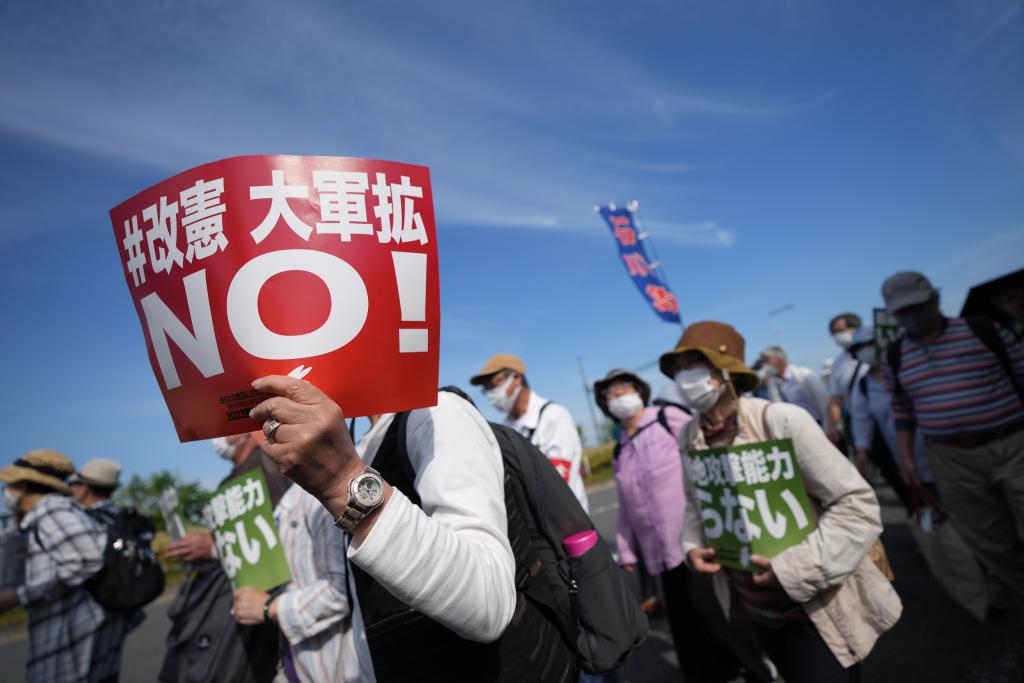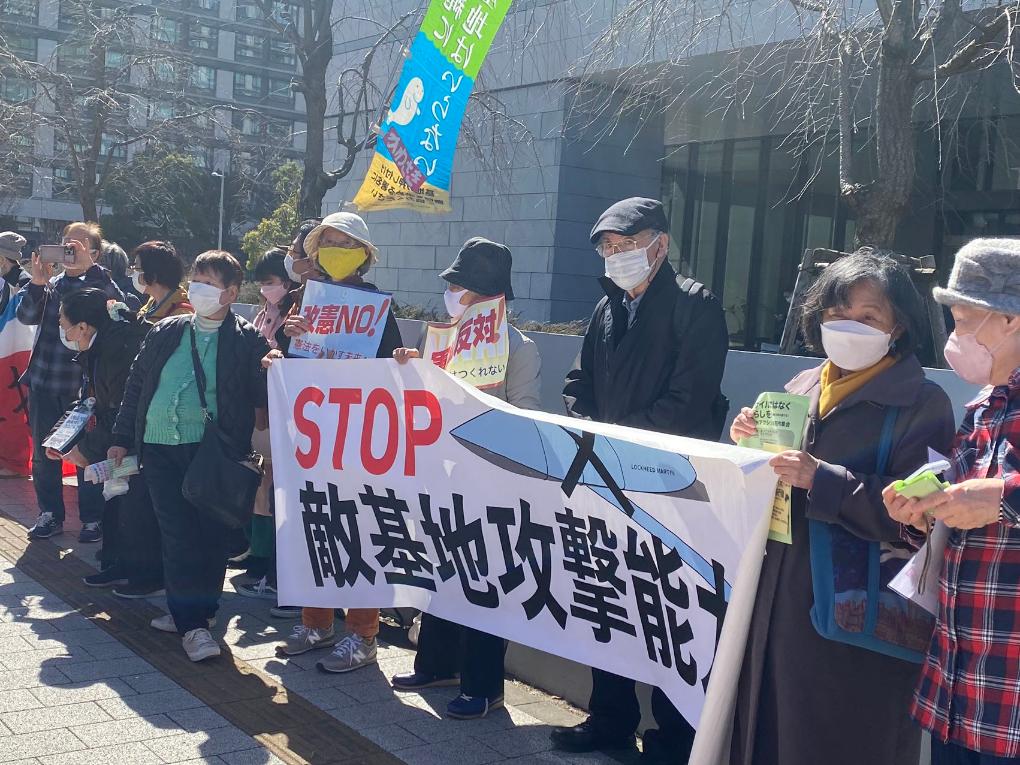History must not be forgotten! Be alert to the trend of Japanese neo-militarism
Xinhua News Agency, Tokyo, August 14th (international observation) History must not be forgotten! Be alert to the trend of Japanese neo-militarism
Xinhua news agency reporter
On August 15th, 1945, Japan declared its unconditional surrender. The Nanjing Massacre that shocked the world, the infamous 731 Japanese troops invading China, and the inhuman "three light policies" & HELIP; … The Japanese invaders committed countless heinous crimes in China. However, Japan selectively "forgets" history, and only emphasizes itself as a "victim of war" in commemorative activities such as the Hiroshima nuclear explosion. Some Japanese politicians also openly pay homage to the Yasukuni Shrine, which honors Class-A war criminals of World War II. Since last year, the Kishida government has made major adjustments to its security foreign policy, which has pushed Japan to the wrong path of abandoning pacifism and returning to militarism.
Analysts pointed out that Japan’s new militaristic trend not only made the Japanese people panic and uneasy, but also aggravated the vigilance and worry of Asian neighbors and the international community about Japan’s future development direction. On the occasion of the 78th anniversary of Japan’s defeat, Japan should deeply reflect on its historical guilt, remember the historical lessons and avoid going further and further on the wrong road.
Breaking the post-war taboo and seeking military loosening
Since the end of World War II, the Japanese right wing has never given up the dream of a political power and the dream of a military power. However, the clause in Article 9 of the Japanese Peace Constitution about "giving up war, giving up the use of force, and not retaining land, sea and air and other combat forces" has put on Japan a "tight spell" of "defending exclusively" and has become an obstacle for the Japanese right wing to realize its dream.

On May 3rd, people held a procession and rally to protect the Constitution in Youming Disaster Prevention Park in Tokyo, Japan. They put up slogans and flags that protect the Constitution, oppose strengthening the army and expanding its arms, do not fight back, and oppose amending the Constitution, calling for protecting the Constitution and peace. Xinhua News Agency reporter Zhang Xiaoyu photo
However, since the end of last year, the Kishida government has successively broken many taboos, actually overhead the peace constitution and realized the military loosening. First of all, through the new version of the National Security Strategy and other three security policy documents (referred to as the "three documents"), we seek to gain "the ability to attack enemy bases", break through the peaceful constitutional constraints and "defend exclusively" commitments, marking a major change in Japan’s security policy after the war. Secondly, it is determined to substantially increase the defense expenditure to match the military expansion, and plans to achieve the goal that defense expenditure accounts for 2% of GDP in fiscal year 2027, breaking the convention that the Japanese government basically followed after the war that defense expenditure accounts for no more than 1%. Third, lift the ban on arms exports. The "Three Principles of Arms Export" which prohibited Japan from exporting weapons after the war was replaced by the "Three Principles of Defence Equipment Transfer" during the reign of former Prime Minister Shinzo Abe. Now, the "Three Documents" propose to revise the "Three Principles of Defence Equipment Transfer" and its detailed rules in an attempt to greatly relax arms export restrictions.
The signs of Japan’s military expansion and preparation for war have triggered Japanese public criticism and public concern. Japan’s anti-war peace organization "Peace Ideas and Suggestions Conference" issued a statement saying that the "three documents" will once again make Japan a country capable of waging war, thus inciting an arms race in East Asia, which is extremely dangerous. Yan Haohou, an honorary professor at Yamaguchi University in Japan, believes that the "three documents" will aggravate the tension between Japan and its Asian neighbors.
Upgrade Japan-US alliance and link NATO eastward.
In recent years, the United States has led the construction of a "quadrilateral mechanism" among the United States, Japan, India and Australia in the Asia-Pacific region, and has formed a "small circle" to encourage camp confrontation.

On February 28th, in Tokyo, Japan, Japanese people held placards to protest the passage of the high defense budget by the Japanese House of Representatives. Xinhua News Agency reporter Guo Dan photo
Since taking office, the Kishida government has been bent on following the United States, willing to be the United States in Depth Charge in the Asia-Pacific region. The new version of the "three documents" on security upgrades the military alliance between Japan and the United States, and switches from the original "defending the US attack on Japan" to the "attacking and defending together" mode. To this end, Japan will purchase and install a large number of American Tomahawk cruise missiles in the next five years, and develop high-speed gliding bombs and hypersonic missiles. Kishida’s abacus is to be humble and small in front of the United States, take the opportunity to expand armaments, and step forward to a "normal country" and a "military power."
The Kishida government has also actively expanded multilateral military cooperation. In addition to cooperating with the United States to build a "quadrilateral mechanism" among the United States, Japan, India and Australia, the US-Japan-ROK military alliance, the US-Japan-Australia, the US-Japan-Philippines and other small multilateral mechanisms, it has also linked NATO countries to intervene in Asia-Pacific affairs, including holding joint military exercises with NATO countries in the Asia-Pacific region and Kishida himself attending NATO summits twice. At the NATO summit in July this year, Japan and NATO reached an agreement on a new military cooperation plan, upgraded the previous plan, and added new contents such as cyber defense, coping with emerging technological challenges such as artificial intelligence, and space security. The cooperation areas increased from 9 to 16. However, at this meeting, NATO’s proposal to set up a liaison office in Japan, which attracted much attention, was not passed due to opposition from France and others.
The trip to Kishida’s NATO summit was strongly opposed by many Japanese people. Protesters criticized NATO as a war group, which would only pose a threat to world peace. The frequent interaction between Kishida’s government and NATO was to introduce war into the Asia-Pacific region. Bi Valerian said that Japan’s approach to NATO and the creation of tension in Asia violated its commitment to China when China and Japan concluded a treaty of peace and friendship 45 years ago.
Rendering "Taiwan Province has something" to incite regional tension
It’s the consistent behavior of some Japanese politicians to follow the US strategy of "controlling China with Taiwan" and deliberately intervene in the Taiwan Province issue. Taro Aso, vice-president of the Liberal Democratic Party of Japan, made wild remarks during his visit to Taiwan Province this month, exaggerating the tension in the Taiwan Strait, provoking confrontation and rudely interfering in China’s internal affairs.
Aso’s remarks during his flight to Taiwan were strongly criticized by people of insight in Japan. Saionji, a representative of the Future-China Research Association, issued a protest statement saying that Aso’s rude words and deeds were naked hostile remarks against China, which violated the Japanese Constitution which renounced the right to participate in the war, the Japan-China Joint Statement and the Japan-China Treaty of Peace and Friendship, and undermined peace and stability in Northeast Asia.
Tomoyuki Quanchuan, a special researcher at the Institute of Regional Studies of Okinawa University in Japan, said that Taiwan Province is not a part of Japan, and the Taiwan Province issue is his internal affair. Aso is the platform of Democratic Progressive Party authorities, and his irresponsible remarks will involve Okinawa in the war, which is extremely immoral.

On April 25, in the Ministry of Foreign Affairs of Tokyo, Japan, Okinawa Prefecture Councillor Dangshan Shengli (third from left) was interviewed by reporters. On April 24th and 25th, respectively, in Tokyo, Japan, a delegation of members from Okinawa Prefecture submitted a resolution on peaceful diplomacy adopted by the prefectural assembly to the Japanese Defense Ministry, the Cabinet Office of Japan and the Japanese Foreign Ministry, calling on the Japanese government not to turn Okinawa into a battlefield, but to solve the problem peacefully through dialogue and diplomacy. Xinhua News Agency reporter Zhang Xiaoyu photo
In recent years, the Japanese government has stepped up efforts to build the southwestern islands, including Okinawa Prefecture, into military fortresses. In March this year, the Ground Self-Defense Force opened a base in Ishigaki Island and deployed garrison and missile units, claiming to fill the long-standing defense gap. This is another base set up by the Self-Defense Forces in the southwest islands after Nagano Island, Miyako Island and Amami Island. In addition, according to the United States-Japan joint operational plan about the so-called "something happened to Taiwan Province" exposed in December 2021, the United States will set up military bases for attacks in the southwest islands with the support of Japan, and there are about 40 candidate sites.
The above actions were strongly opposed by Okinawa residents. They criticized the Japanese government for excessively strengthening its defense and military forces, making them feel that Okinawa may once again become a battlefield. The Governor of Okinawa Prefecture, Yucheng Denny, issued the Peace Declaration at the memorial ceremony for the Okinawa war dead in June this year, saying that the Japanese government has continuously strengthened its defense forces in Okinawa, making the Okinawa people with deep war memories uneasy, and hoped that the Japanese government could ease regional tensions through dialogue. These statements clearly show that Okinawa residents want an island of peace, not a military fortress.